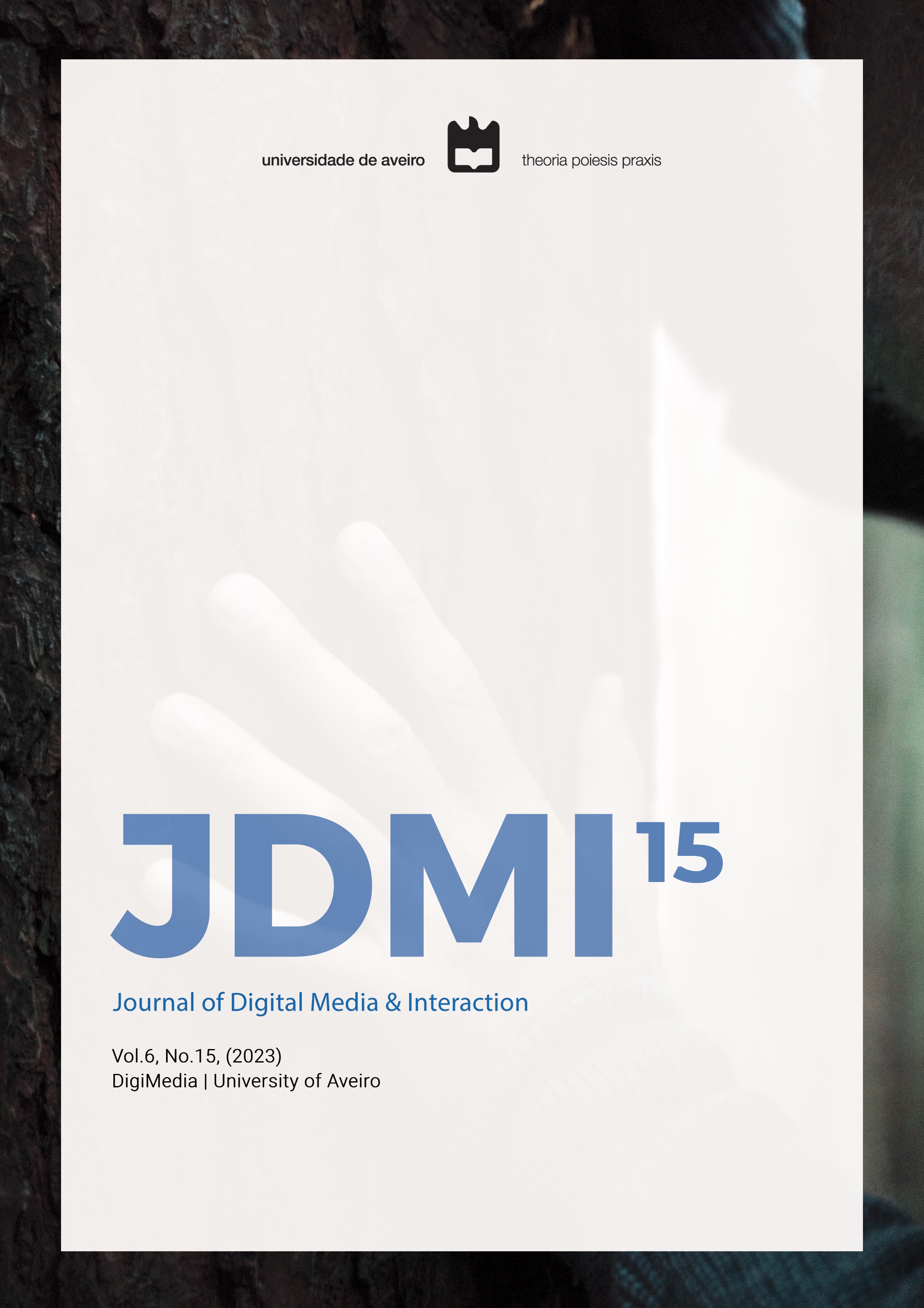The Alienated Senses: Artificial Stimuli for Sensory Perceptions in Interaction with Infomatas
Abstract
This is a qualitative study of exploratory nature, that investigates the senses alienated by the transformation of domestic objects into media, adding to communication and information technologies a functional meaning of interaction. This article aims to substantiate that environment perception through the senses changes when dealing with media infomata, which that have become ways of both media distribution and information storage. The high-tech revolution brought new questions, while household appliances act as media by providing, actively, interactively, or passively, connections between people, infomata, databases and objects. It bets on the alteration of subjectivities from the modulation of experience by interaction human-technology and, therefore, uses the theory of materialities in communication, of the human mechanization and modulations between bodies, technologies, and environment. The qualitative research evolved personal testimonies from 14 volunteers from Rio de Janeiro e São Paulo, during the first semester of 2023. The sample as non-random, purposive sample, constituted of subjects that are knowledgeable individuals in the context of the study. Analysis reveals layers of alienation about the use and role of domestic digital personal assistants and an imminent artificialization of sensorial perception.
Downloads
References
Ackerman, D. (1990) A natural history of the senses. 1st ed. Vintage.
Andrade Pereira, V (2006) Reflexões sobre as materialidades dos meios: embodiment, afetividade e sensorialidade nas dinâmicas de comunicação das novas mídias. Revista Fronteiras, Estudos Midiáticos, VIII (2): 93-101.
Bardin, L. (2016) Análise de Conteúdo. Tradução Luís Antero Reto, Augusto Pinheiro. Edições 70.
Crary. J. (2016) 24/7 Capitalismo Tardio e os Fins do Sono. Tradução: Joaquim Toledo Jr. Ubu Editora.
Crary. J. (2001) Suspensions of Perception: attention, spectacle, and modern culture. The MIT Press.
Csikszentmihalyi, M; Rochberg-Halton, E. (2002) The meaning of things. Domestic symbols and the self. Cambridge University Press.
Domingues, I. (2019) Mídias Vigilantes: o declínio das mídias de difusão de informação e a ascensão das mídias de captura de dados. Trabalho apresentado ao Grupo de Trabalho Consumo e Processos de Comunicação do XXVIII Encontro Anual da Compós, Pontifícia Universidade Católica do Rio Grande do Sul, Porto Alegre - RS, 11 a 14 de junho.
Erthal, A. (2018) A comunicação Mutissensorial: compreendendo modos de sentir. Rio de Janeiro: E-Papers.
Erthal, A. (2021). Os sentidos alienados: os efeitos do Capitalismo Sensorial. Anais do 8º Encontro de GTs de Pós-GraduaçãoCOMUNICON. https://httpscomunicon.wpengine.com/wp-content/uploads/2021/11/GT04_ERTHAL.pdf
Erthal, A. & Antunes, L. G. (2023). A domesticação dos Infômatos: reviravoltas na cultura das interações. Anais do 32° Encontro Anual da COMPÓS. ISSN: 2236-4285
González-Rey, F. (2003). Sujeito e subjetividade. Cengage Learning.
Han, Byung-Chul (2018). Psicopolítica: O neoliberalismo e as novas técnicas de poder. Âyiné.
___________. (2021) Capitalismo e impulso de morte: ensaios e entrevistas. Vozes.
___________. (2022) Não-coisas: Reviravoltas do mundo da vida. Vozes.
Lawshe, C. H. (1975) A quantitative approach to content validity. Personnel Psychology, v. 28, p. 563–575.
Lipovetsky, G. (2016) Da leveza. Rumo a civilização sem peso. Manole.
McLuhan, M. (2003) Understanding Media. The extensions of man. Gingko Press Inc. Critical Edition.
Orgad, S. (2007) The internet as a moral space: The legacy of Roger Silverstone. New Media & Society. Polkinghorne, D. E (1989). Phenomenological research methods. In Valle, R. S. & Halling, S. (Ed.). Existential-Phenomenological perspectives in psychology – Exploring the breadth of human experience. Plenum Press.
Schafer, M. (2001) A afinação do mundo. Uma exploração pela história passada e pelo atual estado do mais negligenciado aspecto do nosso ambiente: a paisagem sonora. Unesp.
Silverstone, R.; Hirch, E. & Morley, D (1992). Information and Communication. Technologies and the moral economy of the household. In: Silverstone, R. & Hirsch, E. Consuming Technologies: Media and Information in Domestic Spaces. Routledge.
Silverstone, R. (2007) Media and Morality. On the rise of the Mediapolis. Polity Press.
Simmel, G (1973). A metrópole e a vida mental. In: Velho, O. G. (Org). O fenômeno urbano. (pp. 11-25) Zahar Editores.
Singer, B. (2004) Modernidade, Hiperestímulo e o início do sensacionalismo popular. In: Charney, L & Schwartz, V. (org.). O cinema e a invenção da vida moderna. (pp 95-123) Cosac & Naify.
Copyright (c) 2023 Ana Amélia Erthal, Prof. Dra., Luli Radfahrer, Prof. Dr.

This work is licensed under a Creative Commons Attribution-NonCommercial-NoDerivatives 4.0 International License.
Authors who publish in the JDMI agree to the following terms:
-
Authors retain copyright and grant the journal the right of first publication with the work simultaneously licensed under a Creative Commons BY-NC-ND 4.0. This licensing allows others to share the work with no changes and acknowledgement of the work's authorship and initial publication in this journal, but not for commercial use.
-
Authors are able to enter into separate, additional contractual arrangements for the non-exclusive distribution of the journal's published version of the work (e.g., post it to an institutional repository or publish it in a book), with an acknowledgement of its initial publication in this journal.
-
Authors are permitted and encouraged to post their work online (e.g., in institutional repositories or on their website) after publication, as it can lead to productive exchanges, as well as earlier and greater citation of published work.
Copyrights to illustrations published in the journal remain with their current copyright holders.
It is the author's responsibility to obtain permission to quote from copyright sources.
Any fees required to obtain illustrations or to secure copyright permissions are the responsibility of authors.
Additional Information
All correspondence concerning contributions, books and other review material should be sent to: deca-jdmi@ua.pt


